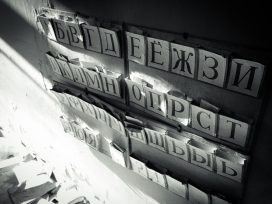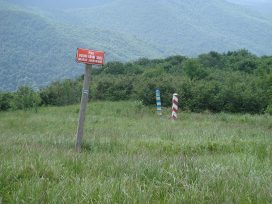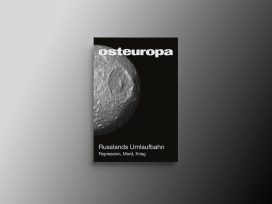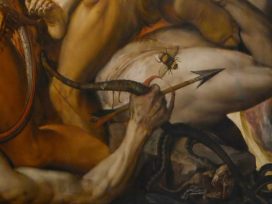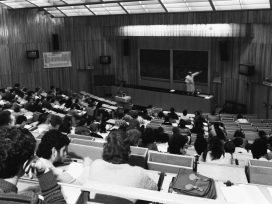Distinctions between how opposing sides in the Russo-Ukrainian war perceive the conflict have important political implications. For Ukrainians, it is a national liberation war, an anti-imperialist and anti-colonial struggle against their former imperial overlord. From the Kremlin’s perspective, the war is not so much an imperial affair as a nationalist Reconquista: it was unleashed in a desperate attempt to redefine the Russian nation – with an eye to reabsorbing Ukraine into the Russian national body. And it is comparatively easier to negotiate for the secession of a former imperial dominion than to come to terms with losing part of what is seen as one’s own self.
In a recent, wide-ranging interview with key Russian media outlets, Dmitry Medvedev, Russia’s former president, bluntly declared that ‘Ukraine is part of Russia’. Not only had Ukraine been part of the Russian Empire in his opinion but also the territories of contemporary Ukraine, populated by the ‘genuine Russian people’, had been ‘part of Russia in the narrow sense’. This statement is a clear indication that the Kremlin sees what happened in 1991 – the collapse of the Soviet Union and the emergence of ‘invented borders’ between the Russian Federation and Ukraine – as the ‘unnatural disunion’ of what used to be one single ‘national whole’.
Nationalizing empire
Historically, Russian national identity – essentially, Russians’ understanding of what constitutes Russia and the Russian people – has been problematically, inextricably linked with Ukraine. Whenever this vital connection has been destabilized, the existential question of ‘what is Russia?’ would immediately pop up.
Since the second half of the nineteenth century, the Russian Empire, like many other major European imperial polities, bar Austria-Hungary, was a nationalizing empire preoccupied with forging a nation within its imperial core. Velikorosy (ethnic Russians) along with Malorosy (Ukrainians) and Belarusians, as the three branches of the ‘pan-Russian people’, were widely seen as constituting the backbone of this emerging imperial nation. ‘The main imperializing nucleus of the Russian Empire, the great all-Russian national unity was formed following the merger of Muscovy with Ukraine,’ argued Petr Savitskii, one of the future leaders of the Eurasianist movement, in his seminal 1915 article. The empire’s ‘Ukrainian’ lands with Kyiv – the ‘mother of the Russian cities’, the site of the baptism of ancient Rus’, and the place where the Tale of Bygone Years (‘Russia’s’ Primary Chronicle) was compiled – were never considered a periphery, a colony, but rather a crucial part of a metropole.
‘Losing’ Ukraine to an external enemy or to a domestic secessionist movement would be tantamount to the dismemberment of the national body. Petr Struve, one of the most prominent imperial nationalist thinkers who contended that the multiethnic Russian Empire was a nation in the making, stated as much in the early 1910s: even imagining Ukraine as something culturally distinct from ‘Russia’ would result in a ‘gigantic and unprecedented schism of the Russian nation’, he wrote. Moreover, there was strong conviction widespread within Russian nationalist circles that the very idea of ‘Ukrainianness’ was essentially a harmful invention, a result of the intrigue of Russia’s enemies. According to writer Vasilii Rozanov and other like-minded Russian nationalist intellectuals, the separate Ukrainian language and other markers of a distinct identity were ‘purposefully invented in order to disunite the Russian people, i.e. to split them into the two halves so that they start fighting each other.’
Socialist federation
The schism that Struve so much dreaded did occur several years later when, following the 1917 Revolution, the Russian Empire fell apart and an independent Ukraine emerged as a fledgling nation-state. This was fleeting, however. Moscow Bolsheviks, the victors in the multi-sided civil war, managed to reconstitute most of the territories of the former empire as the Union of the Soviet Socialist Republics in the early 1920s with Ukraine as one of its constituent parts. Yet crucially, their nationalities policy differed fundamentally from one pursued by imperial bureaucracy. The Soviet leadership dispatched the notion of ‘the greater Russian nation’, comprising the Great Russians, Ukrainians, and Belarusians, to the dustbin of history and, with it, the ambitious strategy of forming an ‘imperial Russian nation’ was seemingly buried for good. Instead, Lenin and Stalin (as Bolshevik Commissar for Nationalities) came up with the idea of a ‘socialist federation’ based on the principle of territorialized ethnicity. Ukrainians became a ‘titular nationality’ with their ‘own’ republic and limited ability to cultivate their distinct cultural identity.
Russian émigrés watching the Bolshevik policies from their European exile were extremely concerned about Ukraine’s cultural and institutional distancing from ‘Russia’. ‘The Ukrainian problem’, argued the Russian liberal Christian thinker Georgii Fedotov in the late 1930s, ‘has an infinitely more profound meaning for Russia than all other national problems. It is a question of not only political structure of Russia and its boundaries but also of its spiritual life.’
The Soviet leadership, however, made sure that the link between Russian national identity and Ukraine was preserved. This was primarily achieved through control over historical discourse: in the Soviet grand narrative, ‘Russian’ history (or rather the ‘history of the USSR’) began on the banks of the Dnieper River. Another important ideological tool was the ‘friendship of the peoples’ concept. It postulated the gradual ‘coming closer together’ and ultimate ‘merger’ of the myriad Soviet ethnic groups – a process that produced, Communist ideologues maintained, a ‘new national and social entity, sovetskii narod’ (Soviet people). In addition, Russians were encouraged to identify with the multiethnic Soviet state in its entirety; the largest Soviet ‘nationality’ didn’t possess its ‘own national state’, because the Russian Soviet Federative Socialist Republic was a federation in its own right. Thus, Soviet came to be equated with Russian, the USSR was widely perceived, both inside and outside the country, as ‘Soviet Russia’, and Ukraine remained a key component of the self-understanding of Russians.
Independent Ukraine
The collapse of the Soviet Union in 1991 and the emergence of the independent Ukrainian state fundamentally destabilized Russian national identity. Not unlike in the early twentieth century when in the anticipation of political upheaval Russian symbolist poet and writer Andrei Bely posed, ‘What is Russia? What does it mean to be Russian?’, these same questions were asked time and again at the century’s end.
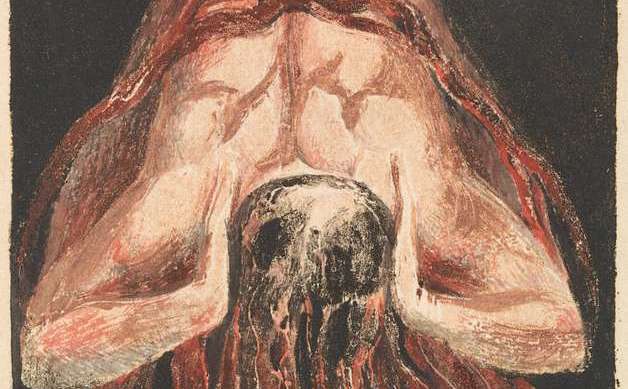
The First Book of Urizen, Plate 16, William Blake, 1794. Image via GetArchive
‘Russia’s’ new incarnation – the Russian Federation – emerged as one of the fifteen new states from under the rubble of the Soviet Union. Having never previously existed within such borders, its identity was flimsy: the notion of ‘historical Russia’ was firmly associated with the defunct USSR. Moreover, more than 20 million ethnic Russians found themselves beyond the RF’s borders, the overwhelming majority of them in Ukraine. In the early 1990s, Boris Yeltsin pursued a two-pronged policy during his presidency: trying to build a civic nation of rossiiane (citizens of the Russian Federation) and settle the relations with ex-Soviet neighbours – above all with Ukraine – within the ‘civilized divorce’ formula. These policies failed due to two mutually reinforcing processes: Russia’s growing authoritarianism, which was the flipside of its inability to carry out comprehensive democratic transformation; and the souring of relations with the West. As a result, Russia bounced back to its historic default mode: hegemons always aspire to be hegemons in what they consider to be their geopolitical backyard.
Additionally, in the late 2010s, several leading Moscow political thinkers started characterizing Russia as a ‘state-civilization’. The vision of Russia as civilization, they argued, overcomes the conundrum created by the rigid empire/nation dichotomy, highlighting both the importance of national identity (the primacy of Russian culture) and tolerance towards other (non-Russian) cultures. Also, unlike the idea of empire, the notion of ‘civilization’ appears devoid of expansionist connotations. However, used in combination with equally hazy notions of Russkii Mir (Russian World) and the Moscow Patriarchate’s pet project of Sviataia Rus’ (Holy Russia), the idea of ‘Russian civilization’ still hinted at the Russian Federation’s incompleteness and evoked the vision of ‘historical Russia’ – a glorious state with a thousand-year-long pedigree, whose East Slavic national core consists of Russians, Ukrainians and Belarusians.
Irredentist assault
President Vladimir Putin is a champion of ‘historical Russia’. As early as 1991, he accused the Bolsheviks of sabotaging the Russian war effort during the First World War, bringing down the empire and partitioning Russian ‘unitary state’ into dozens of ‘principalities that had previously never existed on the world map’. Ukraine and Russo-Ukrainian ‘unity’ play an inordinately huge role in Putin’s historical imagination. The late Harvard historian Richard Pipes aptly noted that ‘Ukraine was always Struve’s blind spot’. Like Struve, Putin is obsessed with Ukraine and its unique significance for Russian national identity. For him, the ‘schism’ of 1991 that resulted in Ukraine’s independence cut right through the Russian national body, having deprived Moscow not only of the millions of its kin and vast ‘historical Russian lands’ but, more crucially, of the most precious and ancient part of ‘Russia’s’ own history. After all, it is absurd to begin one’s historical narrative in the capital of a foreign country.
Nationalist historical treatises that Putin has avidly devoured enhance his sense of mission. He sees himself as the Russian leader who is destined to reassemble the dismembered Russian national body and right the wrongs that the West and internal traitors extorted on ‘historical Russia’ in 1917 and then again in 1991. He appears to be driven by a desire to take revenge for Russia’s defeat in both the First World War and the Cold War. After almost a quarter century in power, Putin is increasingly measuring himself against Russia’s greatest monarchs. ‘He really believes all the stuff he says about sacrality and Peter the Great. He thinks he will be remembered like Peter,’ stated a former senior official.
Inspired by his megalomaniacal historical vision and increasingly isolated, the Kremlin leader would not take advice from prominent Russian historians and leading foreign policy analysts. It is noteworthy that at a series of discussions co-sponsored by the Russian Council on Foreign and Defense Policy and Higher School of Economics in the late 2010s, a distinguished group of experts advanced two important recommendations to policymakers. First, it was suggested that Russia should exercise strategic caution, focusing on patiently building the ‘Concert of Powers’ similar to one the Russian Empire helped to bring about 200 years ago. Second, they warned of imminent disaster if Russia succumbs to the lure of irredentist ideas. The discourse of a ‘divided nation’ is extremely dangerous, they argued: it is unclear how to realize the irredentist programme without ‘destabilizing a huge chunk of geopolitical space’. It is absolutely clear, however, that ‘questioning the borders of the exiting state is a casus belli’. Yet Putin didn’t listen and threw caution to the wind. As Sergei Lavrov, Russian foreign minister, noted, ‘he has three advisors: Ivan the Terrible, Peter the Great, and Catherine the Great.’
The criminal war that the Kremlin has unleashed is an unmitigated disaster. It is also unprecedented in the twenty-first century: a delusional political leader seeking to pursue his utopian nationalist vision based on the antiquated primordialist notion of nation long discarded by scholarship. If there’s anything worse than imperialist expansion, it’s aggressive ethnic nationalism. These types of conflicts are not easily resolved.
